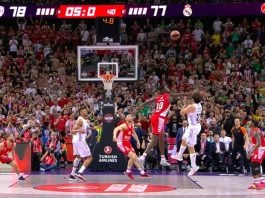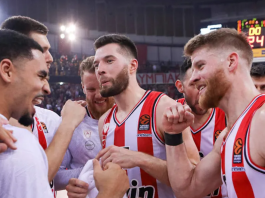With the Reds’ captain being expected to make his return in the first days of March, after staying out of action for 15 to 20 days with a leg injury, there has been a debate on whether he should acquire a different role in the team’s tactics.
Since the game against Fenerbahce at Peace and Friendship Stadium, on December 29, Spanoulis has suffered three injuries that have sidelined him for up to two weeks each time.
Consequently, not only has he missed crucial matches (against Unics Kazan and Fenerbahce on the road as well as the upcoming “clash” with Maccabi in Tel-Aviv, on March 2nd), but he has been out of shape as well, despite making a great start to the season.
Although he was averaging almost 14 points and 6.5 assists in the Euroleague, things have been completely different in the last 50 days, as there has been a significant decline in his numbers and field-goal percentage (almost nine points and 4.5 assists, along with 3.5 turnovers, per game), respectively.
That said, and with the club having a difficult schedule until the end of the regular season, is it time for Olympiacos to start being equally effective without their captain?
The Reds are very consistent this season (having the league’s best defence as well) and are close to earn the home-court advantage in the playoffs, having claimed nine victories in their last 12 games (16-7 record).
Thanks to their impressive chemistry and bench’s depth, coach Giannis Sfairopoulos and his players have managed to overcome the problems that have occurred so far and play at high standards every time Spanoulis is not available.
Against Barcelona and Unics Kazan on the road, with the 34-year-old combo guard not being medically cleared to play, the Greek club was tremendous and earned crucial victories.

Against Fenerbahce in Istanbul, though, the squad came up short in the end and suffered a defeat (67-64), although they had the upper hand, with eight minutes to go (50-60).
However, in the last part of the match, what was obvious was that things would be completely different if Spanoulis was on the floor, as his team-mates lost control of the situation and let their opponents run a 17-4 run to claim the victory.
So, the question now is how the club and the players could adapt to a possible change in Spanoulis’ role, considering he will play in the top level for two or three more years.
The 34-year-old combo guard is an extremely competitive player, who always refuses to give up, no matter his age and problems.
Since the 2011-12 season, when Spanoulis became the undisputed leader, most of the on-ball plays have been focusing on exploiting his great pick n roll and scoring skills.
Olympiacos has become a club full of players that can be very productive alongside the three-time Euroleague champion (Kostas Papanikolaou, Vaggelis Mantzaris, Matt Lojeski, among others), while only co-captain Giorgos Printezis (probably Euroleague’s best power forward) still has a central role in the squad’s tactics, due to his great post-up game.
That said, I don’t think it’s likely for Spanoulis to not have the ball on his hands every time he is on the floor, especially when everything will be on the line.
That’s the first sign that proves Sfairopoulos’ intention to not change his offensive plans, so things will remain the same until the 34-year-old player decides to retire.
Moreover, it would probably be better for the Reds’ leader to start playing once a week and not twice in order to avoid any further damage to his body.
Under the new Euroleague format, the league has become so competitive that the players need to play fewer minutes than expected in order to be at their very best in every game.
Maybe the best solution for the legendary player would be to avoid playing in the domestic league, as Olympiacos’ roster certainly is much more talented than their opponents’ ones (apart from Panathinaikos’ one), and the Reds have no problem to be dominant, even when their captain is out of action.
However, according to the team’s staff, Spanoulis needs to play in the domestic league in order to retain his performance at high standards, so the coach should make a decision on how much playing time the 34-year-old should have in the Greek league’s matches.
Furthermore, I think a better option would be for Spanoulis to play around 15-18 minutes in every game.
With that in mind, the player would be in a better shape, would avoid any painful injuries and also his team-mates would learn to be equally effective, no matter if their captain is on the floor or the bench.
The three-time Euroleague champion is very tough physically and his body helps him have a lot of playing time, despite his age, so he will probably manage to retain his performance at high levels.
What the match against Fenerbahce showed was that his leadership skills and experience are of utmost importance for the club in their effort to go all the way to the end for the fourth time in the last six years.

That said, his return to action is highly anticipated and what remains to be seen is whether he will immediately be at his very best in order to put an end to the debate on whether the time has come for him to have a different role in the club.
To sum up, my opinion is that it’s rather unlikely for the club to change its tactics, regarding Spanoulis, in spite of his injuries, and the 34-year-old captain will keep on being the leader until he decides to retire.






